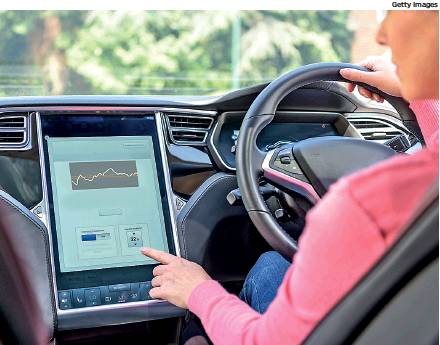Back
Your smart car knows too much about you
- By Elite CIO
 Jan 12, 2020
Jan 12, 2020 17
17
 Your smart car knows too much about you
Your smart car knows too much about you
Onboard Computers Save Everything From Your Contacts To Photos, And Beam Them Continuously To The Manufacturer Without Your Permission.
Around 2010, a 32-inch LCD TV cost more than Rs 30,000. Today, you can buy a 55-inch smart TV for that much. How did TVs become so cheap? A recent article in Business Insider explains smart TV makers don’t need to earn a profit at the time of sale. “Smart TVs can be sold at or near cost to customers...because (brand name) is able to monetise those TVs through data collection, advertising and selling direct-to-consumer entertainment.”
It’s the business model of Google and Facebook carried over to consumer durables. Smart TVs, refrigerators and speakers — not to forget your smartphone — harvest your data for sale. Even your car is probably snooping on you, reports The Washington Post (What does your car know about you? We hacked a Chevy to find out). “Cars have become the most sophisticated computers many of us own,” the article says. You might own one laptop, but your car has “multiple interconnected brains that can generate up to 25GB of data per hour.” At that rate, you can fill up a 1TB hard disk in just over a month of commuting.
While cars have been getting ‘smarter’ with different types of sensors for almost two decades, they couldn’t communicate with manufacturers minuteby-minute until the advent of built-in internet. “In the 2020 model year, most new cars sold in the United States will come with built-in internet connections,” says the article. That includes 100% of Ford, GM and BMW models.
What is built-in internet? A connected car comes with its own data SIM. GM has sold more than 1.1 crore such vehicles. In India, too, some of the newer cars and SUVs flaunt an internet badge. Unlike cars from a few years ago that could share your data with the manufacturer only on workshop visits, a connected smart car is like a “smartphone on wheels, sending and receiving data from apps, insurance firms and pretty much wherever their makers want.”
Forget India, even the US does not have any “federal laws regulating what (data) carmakers can collect or do with.” While some of this data grab seems harmless — such as your acceleration and braking styles, which may be used for product improvement — a lot of it is suspect. Why are car manufacturers collecting your precise location data? Why are they saving your phone ID and contacts? Why does your car’s infotainment system “copy over personal data as soon as you plug in a smartphone”?
When The Washington Post got a security expert to hack into a 2017 Chevrolet’s infotainment computer, “it turned out to contain precise locations, phone identifiers, detailed call logs, list of contacts, people’s addresses, emails and photos.”
Why? Carmakers refuse to answer. They refuse to disclose what data they are recording. They refuse to let you download it and see for yourself. They don’t even let you opt out of it: “Ford cars record locations once every few minutes even when you don’t use the navigation system.”
When you download an app on your phone, or update one, you can review its permissions and the user agreement, but once you buy a smart car, the manufacturer sends updates to it without seeking your permission. And it can go on doing so throughout your car’s 15-year registered life.
How do you delete your data when you sell your smart car? What happens to it after your car goes to the scrapyard? Who guarantees its safety from hackers?
One more thing—you rent a smart car in Goa, plug in your smartphone and enjoy your drive. Two days later, you return the car with all your data in it. How smart is that?
For more: The Washington Post
Source : Time of India - 12 Jan 2020